| Listing 1 - 9 of 9 |
Sort by
|
Book
Year: 1983 Publisher: La Habana : Instituto Cubano de Geodesia y Cartografía,
Abstract | Keywords | Export | Availability | Bookmark
 Loading...
Loading...Choose an application
- Reference Manager
- EndNote
- RefWorks (Direct export to RefWorks)
Historical geography --- Géographie historique --- Maps --- Cartes --- Martí, José, --- Martí, José, --- Martí, José, --- Contemporary America --- Maps. --- Contemporary Cuba --- Maps. --- Contemporary Europe --- Maps. --- Cuba --- Historical geography --- Maps.
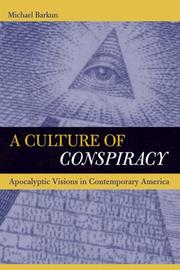
ISBN: 0520248120 Year: 2006 Volume: 15 Publisher: Berkeley University of California Press
Abstract | Keywords | Export | Availability | Bookmark
 Loading...
Loading...Choose an application
- Reference Manager
- EndNote
- RefWorks (Direct export to RefWorks)
Millennialism --- Conspiracies --- Human-alien encounters --- Millénarisme --- Conspiration --- Rencontres avec les extraterrestres --- conspiracy theory --- apocalyptic visions --- contemporary America --- cosmos --- the Bible --- internet alerts --- religion and politics --- American culture --- millennialism --- UFO's --- Armageddon --- scapegoating --- September 11 --- conspiracy theories --- conspiracies --- conspiracy belief --- New World Order (NWO) --- illuminati --- anti-semitism --- antisemitism --- David Icke --- conspiracism --- Protocols of the Elders of Zion --- Jim Keith (1949-1999) --- 11 September 20011
Book
ISBN: 1283278421 9786613278425 0520950178 9780520950177 9781283278423 6613278424 9780520269316 0520269314 9780520269323 0520269322 Year: 2011 Publisher: Berkeley
Abstract | Keywords | Export | Availability | Bookmark
 Loading...
Loading...Choose an application
- Reference Manager
- EndNote
- RefWorks (Direct export to RefWorks)
Urban poverty, along with all of its poignant manifestations, is moving from city centers to working-class and industrial suburbs in contemporary America. Nowhere is this more evident than in East St. Louis, Illinois. Once a thriving manufacturing and transportation center, East St. Louis is now known for its unemployment, crime, and collapsing infrastructure. Abandoned in the Heartland takes us into the lives of East St. Louis's predominantly African American residents to find out what has happened since industry abandoned the city, and jobs, quality schools, and city services disappeared, leaving people isolated and imperiled. Jennifer Hamer introduces men who search for meaning and opportunity in dead-end jobs, women who often take on caretaking responsibilities until well into old age, and parents who have the impossible task of protecting their children in this dangerous, and literally toxic, environment. Illustrated with historical and contemporary photographs showing how the city has changed over time, this book, full of stories of courage and fortitude, offers a powerful vision of the transformed circumstances of life in one American suburb.
Working class --- African Americans --- East Saint Louis (Ill.) --- Social conditions --- Economic conditions --- african american culture. --- american suburbs. --- changing city. --- city centers. --- city services. --- collapsing infrastructure. --- contemporary america. --- courage. --- crime. --- dangerous environment. --- dead end jobs. --- east st louis. --- fortitude. --- illinois. --- industrial suburbs. --- isolated city. --- jobs. --- protecting children. --- quality schools. --- searching for meaning. --- toxic. --- unemployment. --- urban poverty. --- working class.
Book
ISBN: 1282772759 9786612772757 0520945530 9780520945531 9780520253155 0520253159 9780520260887 0520260880 9781282772755 6612772751 Year: 2010 Publisher: Berkeley, Calif. University of California Press
Abstract | Keywords | Export | Availability | Bookmark
 Loading...
Loading...Choose an application
- Reference Manager
- EndNote
- RefWorks (Direct export to RefWorks)
Every summer, thousands gather from around the world in the blistering heat of Nevada's Black Rock Desert for the seven-day celebration of art, community, and fire known as Burning Man. Culminating in the spectacular incineration of a wooden effigy, this festival is grand-scale theater for self-expression, personal transformation, eclectic spirituality, communal bonding, and cultural renewal. In this engrossing ethnography of the Burning Man phenomenon, Lee Gilmore explores why "burners" come in vast numbers to transform a temporary gathering of strangers into an enduring community. Accompanied by a DVD, which provides panoramic views of events, individuals, artworks, and, of course, the climactic final night, the book delves into the varieties of spirituality, ritual, and performance conducted within the festival space.
Ritual --- Festivals --- Burning Man (Festival) --- Black Rock Desert (Nev.) --- United States --- Religious life and customs. --- Religion --- america. --- american culture. --- american festivals. --- american media. --- art. --- black rock desert. --- burners. --- burning man. --- communal bonding. --- community. --- contemporary america. --- demographic studies. --- desert setting. --- effigy. --- ethnographers. --- ethnography. --- festival culture. --- festival events. --- festival space. --- fire. --- historical. --- illustrated. --- mecca. --- modern history. --- nevada. --- nonfiction. --- pilgrimage. --- self expression. --- spiritual journey. --- spiritual rituals. --- spirituality. --- transformation.
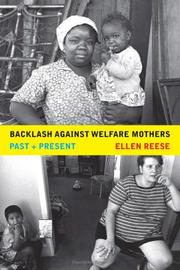
ISBN: 1282771841 9786612771842 0520938712 159875520X 9780520938717 9781598755206 9781282771840 6612771844 9780520244610 0520244613 9780520244627 0520244621 Year: 2005 Publisher: Berkeley University of California Press
Abstract | Keywords | Export | Availability | Bookmark
 Loading...
Loading...Choose an application
- Reference Manager
- EndNote
- RefWorks (Direct export to RefWorks)
Backlash against Welfare Mothers is a forceful examination of how and why a state-level revolt against welfare, begun in the late 1940's, was transformed into a national-level assault that destroyed a critical part of the nation's safety net, with tragic consequences for American society. With a wealth of original research, Ellen Reese puts recent debates about the contemporary welfare backlash into historical perspective. She provides a closer look at these early antiwelfare campaigns, showing why they were more successful in some states than others and how opponents of welfare sometimes targeted Puerto Ricans and Chicanos as well as blacks for cutbacks. Her research reveals both the continuities and changes in American welfare opposition from the late 1940's to the present. Reese brings new evidence to light that reveals how large farmers and racist politicians, concerned about the supply of cheap labor, appealed to white voters' racial resentments and stereotypes about unwed mothers, blacks, and immigrants in the 1950's. She then examines congressional failure to replace the current welfare system with a more popular alternative in the 1960's and 1970's, which paved the way for national assaults on welfare. Taking a fresh look at recent debates on welfare reform, she explores how and why politicians competing for the white vote and right-wing think tanks promoting business interests appeased the Christian right and manufactured consent for cutbacks through a powerful, racially coded discourse. Finally, through firsthand testimonies, Reese vividly portrays the tragic consequences of current welfare policies and calls for a bold new agenda for working families.
Single mothers --- Aid to families with dependent children programs. --- Welfare recipients --- Public welfare --- Mothers --- Single parents --- Single women --- ADC programs --- AFDC programs --- Aid to dependent children programs --- Government policy --- Employment --- History. --- United States --- Social policy. --- 1940s. --- 20th century. --- african americans. --- america. --- american society. --- american welfare. --- antiwelfare campaigns. --- black americans. --- chicanos. --- contemporary america. --- demographic studies. --- ethnographers. --- ethnography. --- historical perspective. --- low income families. --- motherhood. --- mothers. --- nonfiction. --- parenting. --- political history. --- politicians. --- puerto ricans. --- racism. --- safety net. --- welfare culture. --- welfare history. --- welfare opposition. --- welfare policies. --- welfare system. --- working class families.
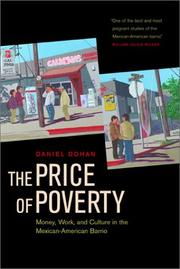
ISBN: 1282359738 0520937279 1597348317 9786612359736 9780520937277 1417520418 9781417520411 9781597348317 0520227565 9780520227569 0520238893 9780520238893 9781282359734 Year: 2003 Publisher: Berkeley, Calif. University of California Press
Abstract | Keywords | Export | Availability | Bookmark
 Loading...
Loading...Choose an application
- Reference Manager
- EndNote
- RefWorks (Direct export to RefWorks)
Drawing on two years of ethnographic fieldwork in two impoverished California communities-one made up of recent immigrants from Mexico, the other of U.S.-born Chicano citizens-this book provides an invaluable comparative perspective on Latino poverty in contemporary America. In northern California's high-tech Silicon Valley, author Daniel Dohan shows how recent immigrants get by on low-wage babysitting and dish-cleaning jobs. In the housing projects of Los Angeles, he documents how families and communities of U.S.-born Mexican Americans manage the social and economic dislocations of persistent poverty. Taking readers into worlds where public assistance, street crime, competition for low-wage jobs, and family, pride, and cross-cultural experiences intermingle, The Price of Poverty offers vivid portraits of everyday life in these Mexican American communities while addressing urgent policy questions such as: What accounts for joblessness? How can we make sense of crime in poor communities? Does welfare hurt or help?
Hispanic American neighborhoods --- Poor --- Mexican Americans --- Chicanos --- Hispanos --- Ethnology --- Barrios (United States) --- Neighborhoods, Hispanic American --- Ethnic neighborhoods --- Disadvantaged, Economically --- Economically disadvantaged --- Impoverished people --- Low-income people --- Pauperism --- Poor, The --- Poor people --- Persons --- Social classes --- Poverty --- Economic conditions. --- Economic conditions --- East Los Angeles (Calif.) --- San Jose (Calif.) --- City of San José (Calif.) --- Ethnic relations. --- Urban poor --- City dwellers --- american citizens. --- barrios. --- california. --- chicano citizens. --- class differences. --- contemporary america. --- cross cultural experiences. --- ethnographers. --- ethnographic study. --- fieldwork. --- financial concerns. --- impoverished communities. --- latino poverty. --- latinos. --- los angeles. --- low wage jobs. --- mexican american communities. --- mexican american culture. --- mexican americans. --- mexican immigrants. --- modern history. --- money and culture. --- poverty. --- public assistance. --- recent immigrants. --- regional survey. --- silicon valley. --- work culture. --- working class. --- Sociology of culture --- Social problems --- Sociology of minorities --- Community organization --- Mexico --- United States --- United States of America
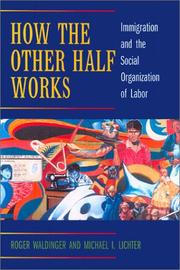
ISBN: 0520231627 0520229800 9786612359545 0520936175 1597346640 1282359541 9780520936171 0585466181 9780585466187 9781597346641 9780520229808 9780520231627 9781282359543 Year: 2003 Publisher: Berkeley, Calif. University of California Press
Abstract | Keywords | Export | Availability | Bookmark
 Loading...
Loading...Choose an application
- Reference Manager
- EndNote
- RefWorks (Direct export to RefWorks)
How the Other Half Works solves the riddle of America's contemporary immigration puzzle: why an increasingly high-tech society has use for so many immigrants who lack the basic skills that today's economy seems to demand. In clear and engaging style, Waldinger and Lichter isolate the key factors that explain the presence of unskilled immigrants in our midst. Focusing on Los Angeles, the capital of today's immigrant America, this hard-hitting book elucidates the other side of the new economy, showing that hiring is finding not so much "one's own kind" but rather the "right kind" to fit the demeaning, but indispensable, jobs many American workers disdain.
Alien labor. --- Alien labor-- California-- Los Angeles County. --- California. --- Employer attitude surveys. --- Immigrants - Social networks - California - Los Angeles County. --- Los Angeles County. --- Unskilled labor. --- Unskilled labor - California - Los Angeles County. --- Foreign workers --- Unskilled labor --- Immigrants --- Employer attitude surveys --- Business & Economics --- Labor & Workers' Economics --- Social networks --- #SBIB:316.334.2A342 --- #SBIB:39A6 --- #SBIB:316.8H16 --- Arbeidssociologie: ongelijkheden op de arbeidsmarkt: migranten op de arbeidsmarkt --- Etniciteit / Migratiebeleid en -problemen --- Welzijns- en sociale problemen: migranten, rassenrelaties --- Laborers --- Low-skilled labor --- Low-skilled workers --- Emigrants --- Foreign-born population --- Foreign population --- Foreigners --- Migrants --- Attitude surveys, Employer --- Management attitude surveys --- Alien labor --- Aliens --- Foreign labor --- Guest workers --- Guestworkers --- Immigrant labor --- Immigrant workers --- Migrant labor (Foreign workers) --- Migrant workers (Foreign workers) --- Employment --- Labor --- Persons --- Surveys --- Employees --- California --- Los Angeles County (Calif.) --- Noncitizen labor --- Noncitizens --- career. --- civic. --- class issues. --- contemporary america. --- historians. --- historical. --- history. --- immigrant experience. --- immigrants. --- immigration. --- labor and culture. --- labor issues. --- labor organizations. --- labor studies. --- los angeles. --- migrant workers. --- modern economy. --- modern history. --- nonfiction. --- political science. --- political. --- race and class. --- social issues. --- social studies. --- sociology. --- students and teachers. --- survey. --- textbooks. --- unskilled immigrants. --- unskilled workers. --- workforce.
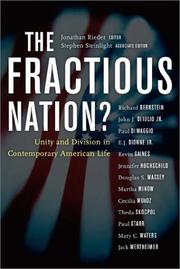
ISBN: 0520236637 0520220439 0520936914 1282359630 9786612359637 1417525584 9780520936911 9781417525584 9780520220430 0520236629 9780520236622 9780520236639 Year: 2003 Publisher: Berkeley University of California Press
Abstract | Keywords | Export | Availability | Bookmark
 Loading...
Loading...Choose an application
- Reference Manager
- EndNote
- RefWorks (Direct export to RefWorks)
What are we to make of the speed with which the new climate of national solidarity emerged after September 11? Does it not look strange against a backdrop of the much-touted divisiveness of American life? In truth, The Fractious Nation? makes clear, the contrast of the time of divisiveness before and the time of unity that followed is much too stark, indeed. Less than a year before two planes slammed into the World Trade Center, the 2000 presidential election produced not just the starkly blue and red electoral map but also the two tribal Americas those totemic colors emblazoned. And from the cultural wars to immigration restriction, from the Christian right to political correctness, recent decades have witnessed much hand-wringing on the left and the right about the fragmentation of American life. The Fractious Nation? enlists the critical intelligence of fourteen distinguished contributors who illuminate the schisms in American life and the often volatile debates they have inspired in the realms of culture, ethnic and racial pluralism, and political life. The collective wisdom of The Fractious Nation? suggests a counterview to all the overheated rhetoric. The authors warn against fixating on flamboyant incidents of racial conflict when black-and-white values overlap considerably. On a range of cultural issues, the gap between our citizens has closed as well. And even as the rivalry between liberalism and conservatism transmutes into new forms, the political center remains vital and democratic. We are tied together not just by shared values but by institutions-the Constitution, the culture of consumption, the etiquette of ethnic respect. In private life and public affairs, our nation has expanded the meaning of democratic citizenship. Still, there's no room for self-congratulations here. Tendencies toward preoccupation with private life encourage indifference to the suffering of the less privileged. This is also one of the main failings of the narrative of fragmentation: In its focus on matters of shared values, it too distracts from issues of poverty and inequality that also fragment the human spirit. Contributors: Richard Bernstein, John J. DiIulio Jr., Paul DiMaggio, E.J. Dionne, Jr., Kevin Gaines, Jennifer Hochschild, Douglas S. Massey, Martha Minow, Cecilia Muñoz, Jonathan Rieder, Theda Skocpol, Paul Starr, Mary C. Waters, Jack Wertheimer
National characteristics [American ] --- United States --- Politics and government --- 1989 --- -Political culture --- Citizenship --- Social aspects --- Moral conditions --- Social conditions --- 1980 --- -Pluralism (Social sciences) --- Social conflict --- Cultural pluralism --- National characteristics, American --- Political culture --- #KVHA:American Studies --- #KVHA:Verenigde Staten --- American national characteristics --- Birthright citizenship --- Citizenship (International law) --- National citizenship --- Nationality (Citizenship) --- Law and legislation --- #A0507PSA --- Moral conditions. --- Political science --- Public law --- Allegiance --- Civics --- Domicile --- Political rights --- Citizenship. --- National characteristics, American. --- Pluralism (Social sciences). --- Political culture. --- Political culture - United States. --- Social conflict. --- United States - Politics and government - 1989-. --- Regions & Countries - Americas --- History & Archaeology --- United States - General --- Cultural diversity --- Diversity, Cultural --- Diversity, Religious --- Ethnic diversity --- Pluralism (Social sciences) --- Pluralism, Cultural --- Religious diversity --- Culture --- Cultural fusion --- Ethnicity --- Multiculturalism --- ABŞ --- ABSh --- Ameerika Ühendriigid --- America (Republic) --- Amerika Birlăshmish Shtatlary --- Amerika Birlăşmi Ştatları --- Amerika Birlăşmiş Ştatları --- Amerika ka Kelenyalen Jamanaw --- Amerika Qūrama Shtattary --- Amerika Qŭshma Shtatlari --- Amerika Qushma Shtattary --- Amerika (Republic) --- Amerikai Egyesült Államok --- Amerikanʹ Veĭtʹsėndi︠a︡vks Shtattnė --- Amerikări Pĕrleshu̇llĕ Shtatsem --- Amerikas Forenede Stater --- Amerikayi Miatsʻyal Nahangner --- Ameriketako Estatu Batuak --- Amirika Carékat --- AQSh --- Ar. ha-B. --- Arhab --- Artsot ha-Berit --- Artzois Ha'bris --- Bí-kok --- Ē.P.A. --- EE.UU. --- Egyesült Államok --- ĒPA --- Estados Unidos --- Estados Unidos da América do Norte --- Estados Unidos de América --- Estaos Xuníos --- Estaos Xuníos d'América --- Estatos Unitos --- Estatos Unitos d'America --- Estats Units d'Amèrica --- Ètats-Unis d'Amèrica --- États-Unis d'Amérique --- Fareyniḳṭe Shṭaṭn --- Feriene Steaten --- Feriene Steaten fan Amearika --- Forente stater --- FS --- Hēnomenai Politeiai Amerikēs --- Hēnōmenes Politeies tēs Amerikēs --- Hiwsisayin Amerikayi Miatsʻeal Tērutʻiwnkʻ --- Istadus Unidus --- Jungtinės Amerikos valstybės --- Mei guo --- Mei-kuo --- Meiguo --- Mî-koet --- Miatsʻyal Nahangner --- Miguk --- Na Stàitean Aonaichte --- NSA --- S.U.A. --- SAD --- Saharat ʻAmērikā --- SASht --- Severo-Amerikanskie Shtaty --- Severo-Amerikanskie Soedinennye Shtaty --- Si︠e︡vero-Amerikanskīe Soedinennye Shtaty --- Sjedinjene Američke Države --- Soedinennye Shtaty Ameriki --- Soedinennye Shtaty Severnoĭ Ameriki --- Soedinennye Shtaty Si︠e︡vernoĭ Ameriki --- Spojené obce severoamerické --- Spojené staty americké --- SShA --- Stadoù-Unanet Amerika --- Stáit Aontaithe Mheiriceá --- Stany Zjednoczone --- Stati Uniti --- Stati Uniti d'America --- Stâts Unîts --- Stâts Unîts di Americhe --- Steatyn Unnaneysit --- Steatyn Unnaneysit America --- SUA (Stati Uniti d'America) --- Sŭedineni amerikanski shtati --- Sŭedinenite shtati --- Tetã peteĩ reko Amérikagua --- U.S. --- U.S.A. --- United States of America --- Unol Daleithiau --- Unol Daleithiau America --- Unuiĝintaj Ŝtatoj de Ameriko --- US --- USA --- Usono --- Vaeinigte Staatn --- Vaeinigte Staatn vo Amerika --- Vereinigte Staaten --- Vereinigte Staaten von Amerika --- Verenigde State van Amerika --- Verenigde Staten --- VS --- VSA --- Wááshindoon Bikéyah Ałhidadiidzooígíí --- Wilāyāt al-Muttaḥidah --- Wilāyāt al-Muttaḥidah al-Amirīkīyah --- Wilāyāt al-Muttaḥidah al-Amrīkīyah --- Yhdysvallat --- Yunaeted Stet --- Yunaeted Stet blong Amerika --- ZDA --- Združene države Amerike --- Zʹi︠e︡dnani Derz︠h︡avy Ameryky --- Zjadnośone staty Ameriki --- Zluchanyi︠a︡ Shtaty Ameryki --- Zlucheni Derz︠h︡avy --- ZSA --- Η.Π.Α. --- Ηνωμένες Πολιτείες της Αμερικής --- Америка (Republic) --- Американь Вейтьсэндявкс Штаттнэ --- Америкӑри Пӗрлешӳллӗ Штатсем --- САЩ --- Съединените щати --- Злучаныя Штаты Амерыкі --- ولايات المتحدة --- ولايات المتّحدة الأمريكيّة --- ولايات المتحدة الامريكية --- 미국 --- États-Unis --- É.-U. --- ÉU --- american culture. --- american life. --- american society. --- americans. --- anthology. --- christianity. --- contemporary america. --- cultural conflict. --- cultural issues. --- democracy. --- ethnic pluralism. --- immigration restrictions. --- modern history. --- national division. --- national identity. --- nonfiction. --- party politics. --- political correctness. --- political life. --- racial conflicts. --- racial pluralism. --- september 11. --- social inequality. --- textbooks. --- tribalism. --- united states. --- unity and division. --- us constitution.

ISBN: 9786612355905 0520928075 1282355902 1597347019 9780520928077 0585389888 9780585389882 0520232070 9780520232075 9781597347013 0520222962 9780520222960 0520216660 9780520216662 6612355905 9781282355903 Year: 2000 Publisher: Berkeley University of California Press
Abstract | Keywords | Export | Availability | Bookmark
 Loading...
Loading...Choose an application
- Reference Manager
- EndNote
- RefWorks (Direct export to RefWorks)
Robin Lakoff gets to the heart of one of the most fascinating and pressing issues in American society today: who holds power and how they use it, keep it, or lose it. In a brilliant and vastly entertaining discussion of news events that have occupied an enormous amount of media space--political correctness, the Anita Hill/Clarence Thomas hearings, Hillary Rodham Clinton as First Lady, O. J. Simpson's murder trial, the Ebonics controversy, and the Clinton sex scandal--Lakoff shows that the struggle for power and status at the end of the century is being played out as a war over language. Controlling language is a basis for all power, she says, and therefore it is worth fighting for. As a result, newly emergent groups, especially blacks and women, are contending with middle- to upper-class white men for a share in "language rights." Lakoff's introduction to linguistic theories and the philosophy of language lays the groundwork for an exploration of news stories that meet what she calls the UAT (Undue Attention Test). As the stories became the subject of talk-show debates, late-night comedy routines, Web sites, and magazine articles, they were embroidered with additional meanings, depending on who was telling the story. Race, gender, or both are at the heart of these stories, and each one is about the right to construct meanings from language in short, to possess power. Because language tells us how we are connected to one another, who has power and who does not, the stories reflect the language war. We use language to analyze what we call "reality," the author argues, but we mistrust how language is used today--witness the "politics of personal destruction" following the Clinton impeachment. Yet Lakoff sees in the struggle over language a positive goal: equality in the creation of our national discourse. Her writing is accessible and witty, and her excerpts from the media are used to great effect.
Sociolinguistics --- Mass media and language --- Power (Social sciences) --- Language and mass media --- Language and languages --- United States --- ABŞ --- ABSh --- Ameerika Ühendriigid --- America (Republic) --- Amerika Birlăshmish Shtatlary --- Amerika Birlăşmi Ştatları --- Amerika Birlăşmiş Ştatları --- Amerika ka Kelenyalen Jamanaw --- Amerika Qūrama Shtattary --- Amerika Qŭshma Shtatlari --- Amerika Qushma Shtattary --- Amerika (Republic) --- Amerikai Egyesült Államok --- Amerikanʹ Veĭtʹsėndi︠a︡vks Shtattnė --- Amerikări Pĕrleshu̇llĕ Shtatsem --- Amerikas Forenede Stater --- Amerikayi Miatsʻyal Nahangner --- Ameriketako Estatu Batuak --- Amirika Carékat --- AQSh --- Ar. ha-B. --- Arhab --- Artsot ha-Berit --- Artzois Ha'bris --- Bí-kok --- Ē.P.A. --- EE.UU. --- Egyesült Államok --- ĒPA --- Estados Unidos --- Estados Unidos da América do Norte --- Estados Unidos de América --- Estaos Xuníos --- Estaos Xuníos d'América --- Estatos Unitos --- Estatos Unitos d'America --- Estats Units d'Amèrica --- Ètats-Unis d'Amèrica --- États-Unis d'Amérique --- Fareyniḳṭe Shṭaṭn --- Feriene Steaten --- Feriene Steaten fan Amearika --- Forente stater --- FS --- Hēnomenai Politeiai Amerikēs --- Hēnōmenes Politeies tēs Amerikēs --- Hiwsisayin Amerikayi Miatsʻeal Tērutʻiwnkʻ --- Istadus Unidus --- Jungtinės Amerikos valstybės --- Mei guo --- Mei-kuo --- Meiguo --- Mî-koet --- Miatsʻyal Nahangner --- Miguk --- Na Stàitean Aonaichte --- NSA --- S.U.A. --- SAD --- Saharat ʻAmērikā --- SASht --- Severo-Amerikanskie Shtaty --- Severo-Amerikanskie Soedinennye Shtaty --- Si︠e︡vero-Amerikanskīe Soedinennye Shtaty --- Sjedinjene Američke Države --- Soedinennye Shtaty Ameriki --- Soedinennye Shtaty Severnoĭ Ameriki --- Soedinennye Shtaty Si︠e︡vernoĭ Ameriki --- Spojené staty americké --- SShA --- Stadoù-Unanet Amerika --- Stáit Aontaithe Mheiriceá --- Stany Zjednoczone --- Stati Uniti --- Stati Uniti d'America --- Stâts Unîts --- Stâts Unîts di Americhe --- Steatyn Unnaneysit --- Steatyn Unnaneysit America --- SUA (Stati Uniti d'America) --- Sŭedineni amerikanski shtati --- Sŭedinenite shtati --- Tetã peteĩ reko Amérikagua --- U.S. --- U.S.A. --- United States of America --- Unol Daleithiau --- Unol Daleithiau America --- Unuiĝintaj Ŝtatoj de Ameriko --- US --- USA --- Usono --- Vaeinigte Staatn --- Vaeinigte Staatn vo Amerika --- Vereinigte Staaten --- Vereinigte Staaten von Amerika --- Verenigde State van Amerika --- Verenigde Staten --- VS --- VSA --- Wááshindoon Bikéyah Ałhidadiidzooígíí --- Wilāyāt al-Muttaḥidah --- Wilāyāt al-Muttaḥidah al-Amirīkīyah --- Wilāyāt al-Muttaḥidah al-Amrīkīyah --- Yhdysvallat --- Yunaeted Stet --- Yunaeted Stet blong Amerika --- ZDA --- Združene države Amerike --- Zʹi︠e︡dnani Derz︠h︡avy Ameryky --- Zjadnośone staty Ameriki --- Zluchanyi︠a︡ Shtaty Ameryki --- Zlucheni Derz︠h︡avy --- ZSA --- Η.Π.Α. --- Ηνωμένες Πολιτείες της Αμερικής --- Америка (Republic) --- Американь Вейтьсэндявкс Штаттнэ --- Америкӑри Пӗрлешӳллӗ Штатсем --- САЩ --- Съединените щати --- Злучаныя Штаты Амерыкі --- ولايات المتحدة --- ولايات المتّحدة الأمريكيّة --- ولايات المتحدة الامريكية --- 미국 --- Languages --- Political aspects. --- Spojené obce severoamerické --- #SBIB:012.AANKOOP --- #SBIB:309H518 --- Verbale communicatie: sociologie, antropologie, sociolinguistiek --- États-Unis --- É.-U. --- ÉU --- Language and culture --- Linguistics --- Sociology --- Integrational linguistics (Oxford school) --- african american. --- american history. --- american society. --- anita hill. --- clarence thomas. --- contemporary america. --- discourse. --- ebonics. --- gender. --- government. --- language. --- law and order. --- legal issues. --- media. --- modern america. --- modern american. --- modern society. --- modern world. --- murder trial. --- news. --- oj simpson. --- political correctness. --- politics. --- pop culture. --- power. --- race. --- racism. --- reality. --- sex scandal. --- trials. --- united states history. --- us history. --- womens issues. --- womens studies.
| Listing 1 - 9 of 9 |
Sort by
|

 Search
Search Feedback
Feedback About UniCat
About UniCat  Help
Help News
News